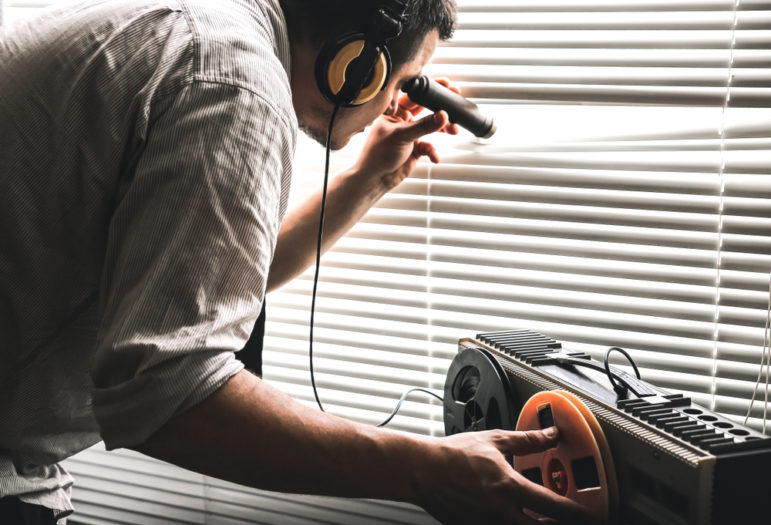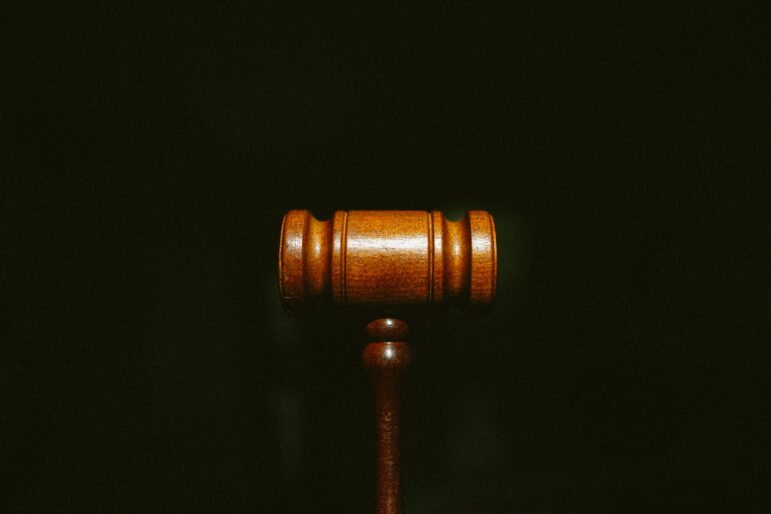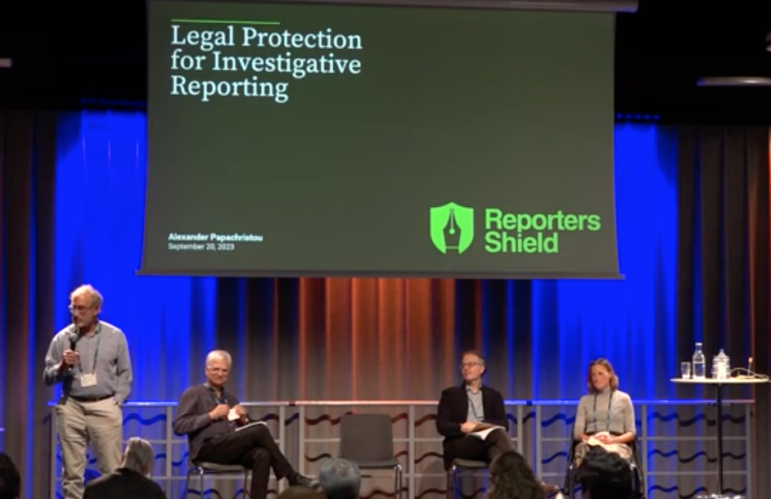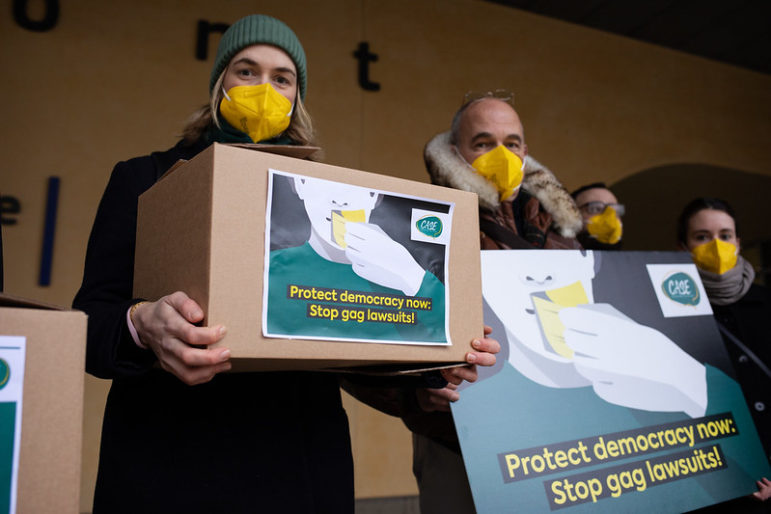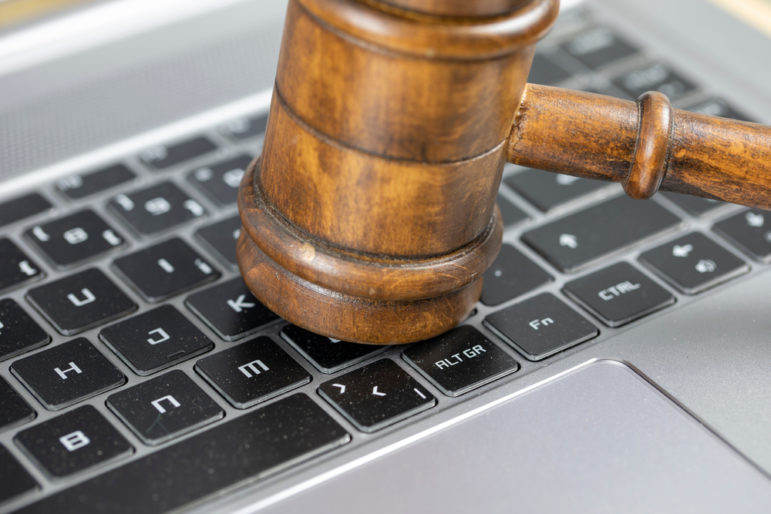

Image: Shutterstock
How Reporters Shield Is Protecting Newsrooms from SLAPP Attacks Around the World
Read this article in
Launched from scratch just last year, an innovative program to defend investigative newsrooms against legal intimidation – Reporters Shield – is up and running. And hitting back.
The nonprofit organization is designed to counter the financial and time costs of SLAPPs (strategic lawsuits against public participation), which bad actors increasingly use to muzzle investigative stories or even ruin critical newsrooms. And is already helping news organizations defend legal attacks in several countries this year.

GIJN will host a webinar conversation with Clothilde Redfern, executive director of Reporters Shield, on September 19. Attendees will be able to ask questions about the program, membership model, and the services it provides. Click the image above to sign up.
GIJN interviewed the new executive director of Reporters Shield, Clothilde Redfern, on its rapid membership growth and its potential to stop a cancer on accountability at prices that even small newsrooms can afford. Redfern was formerly the director of the Rory Peck Trust
While the program borrows concepts from the insurance industry to be sustainable, one striking takeaway from the interview is that its approach could not be more different. For instance: it doesn’t penalize a member for being high-risk because it’s sued all the time – as this, in itself, is an indication that the newsroom is making a consistent impact.
Describing this increasingly common threat, Attila Biro, the co-founder and editor-in-chief of independent Romanian investigative outlet Context.ro, said: “We are not above the law as journalists, but these strategic litigations are just meant to drain us. We are using up days of reporting and editing to manage just a single case, when we could track more of the precious public funds generated by honest Romanians who pay their taxes.”
This interview has been edited for length and clarity.
GIJN: What is your mission?
Clothilde Redfern: Our principle aim is to protect investigative journalism and other public interest reporting to help ensure that independent outlets aren’t silenced or crippled by legal costs. We’ve seen that legal attacks against outlets are increasing, and that laws are being weaponized against newsrooms by the rich and powerful. And there are lots of unscrupulous law firms that are only too happy to be paid to take journalists to court. SLAPPS are often not about winning the case. They know there’s nothing untrue in the piece you’re trying to publish — they’re just trying to intimidate you or drain your financial resources. The model for Reporters Shield is that of a mutual defense fund. For that to work, it has to operate at scale. So, the ambition is to have a global membership program, where all of our members get advice on legal risks to do with investigative reporting, but also coverage for legal costs, which increasingly can be fatal for small outlets.
GIJN: How is the service designed?
CR: The program rests on a three-pronged approach: prevent; respond; defend. Those are the three primary benefits of membership. We have legal partners in different parts of the world that help us coordinate legal assistance to members, and that legal assistance is paid. That’s the big difference between Reporters Shield and other legal assistance outlets out there. Because your membership pays the lawyers, it’s more reliable. If you need something reviewed, you’re probably on deadline. If you are a member of Reporters Shield, you can have access to preventative legal services, which is basically an assessment of the legal risks that your reporting might be exposed to on a particular story. Like an informal pre-publication review, it will give you a very good understanding of the legal risks you should be aware of.
That’s the “prevent” side. At the moment, the ratio is tipped heavily toward prevention – people coming to us with copies of stories and asking to have a lawyer vet the copy for what the legal risks might be.
“Respond” is about lawyers sending a really robust response to a formal legal threat. If you’ve got a letter from a major firm, most people are terrified by that and have no idea how to respond, but often the best way of nipping a SLAPP case in the bud is to get a really experienced lawyer to respond really strongly right away. So, the bad actors know you won’t be cowed, and that you have legal support behind you.
Then there’s “defend,” which happens at court. The nonprofit Cyrus R. Vance Center for International Justice, which is a pro bono program of the New York City Bar Association, are our legal partners, and they coordinate legal service delivery. They talk with regional coordinating partners who are on retainer with us, and work with us to find the right legal assistance, and the right lawyer for a member’s case. It’s even better if the outlet already has or knows a lawyer they trust, and knows the local jurisdiction, but if they don’t, we can find one through our own networks. We will pay that lawyer to give the advice you need, and that lawyer will draft the response or act as your defense in court.
GIJN: Who is eligible for membership?
CR: Reporters Shield is aimed at organizations first and foremost. We operate with legal entities rather than individual people, and that’s partly to lower the risk of bad actors. With journalism outlets that are registered as legal entities we can check that they are independently owned and operated, and we can also check they have robust editorial policies that suggest more than one person is overseeing a report and the fact checking. So, yes, it remains difficult for freelancers to find insurance cover. However if they are sued for a report that was published by a member of Reporter’s Shield – with consent of the member – we will find a lawyer to defend them. Other criteria for applicants are that they should be focused on public interest, or investigative reporting; that they are either nonprofit or have transparent ownership; and that they adhere to editorial independence and professional standards.
Membership is currently focused on print and online outlets only. The reason for that is we are targeting small independent investigative outlets that do not have access to in-house lawyers or insurance. So the outlets that are the most vulnerable. And most broadcast outlets do have in-house lawyers. That said, we cover non-live, up to 30 minutes of scripted recorded audio or video.
GIJN: What are the origins of the idea, and of the organization?
CR: Drew Sullivan (co-founder of the Organized Crime and Corruption Reporting Project) and Alex Papachristou (executive director of the Cyrus R. Vance Centre for International Justice) conceived Reporters Shield after many years of working together to defend OCCRP from legal attacks. Other outlets were facing the same problem with this growing tide of SLAPPS but traditional media insurance was prohibitively expensive, so Reporters Shield was created to provide an affordable model that responds to the needs of public service reporting.
It was founded on May 1, 2023 – on World Press Freedom Day – and it was announced as part of one of several USAID seed funding initiatives, as a global membership program to provide coverage for legal costs, should any of the members be sued for their reporting.
GIJN: How has membership grown since your recent founding? Have you defended any SLAPP suits yet?
CR: We have received over 150 applications so far, of which 30 outlets have already been confirmed as members. We have received and approved several requests for legal defense benefits and have provided legal representation in court for three members. We are building our membership in phases: Phase 1 includes outlets based in South America, North America, Europe, and Central Asia; phase 2 includes those in Africa, the Middle East, and the Caribbean; and phase 3 will include those in Asia, Australia, and the Pacific.
We’re well into phase 2, and expecting to launch phase 3 later this year. We use those phases so we can manage applications, and also to tie in with our geographical partners who can find local lawyers specializing in SLAPPS who know how to protect journalists. We’re still building our legal network in Asia.

Reporters Shield is rolling out its services in three phases, geographically. Image: Screenshot, Reporters Shield
GIJN: As far as possible, could you describe one of your first defense cases?
CR: A Central European publisher, one of our earliest members, published a report on apparent real estate fraud by a foreign investor who then sued for defamation in the member’s country. We vetted and approved the lawyer proposed by the member and now are paying the lawyer’s fees to defend the member.
GIJN: Do members publicly disclose their membership?
CR: It’s up to members to decide. For some, membership itself represents a protective measure, and some members do like to share that they have signed on, because it gives them a certain cachet as a serious investigative journalism outlet. That’s partly because the application process is rigorous, and the journalism due diligence process is robust, so they’re proud of becoming members. Initially, we would have loved to publish names of members, but we realized that some other outlets feel disclosure may invite lawsuits, perhaps because someone might think, “Well, this outlet is supported by someone with big pockets; let’s sue them.” That’s misleading, because we don’t have big pockets! But some just don’t want to do anything they feel might encourage more vexatious lawsuits.
GIJN: How do outlets communicate with you, negotiate fees, and file claims?
CR: It’s through our membership team. We have three people on that team who are in touch with members directly, and who, between them, speak English, French, Spanish, and Arabic, and they manage all our applications. A pricing committee sets the membership fee; the Vance Center does legal due diligence, and a journalism committee does editorial due diligence.
You can either email info@reportersshield.org to book an informational call, or, if you know you want to join, you can go right to the application form on our website.
GIJN: How does membership pricing work – and what is the minimum cost for cover?
CR: So far, the average fee for members is US$3,500 a year. For most members, that provides up to US$500,000 of coverage. So they could rack up $500,000 in legal fees, and we would cover the costs, except for any liability that the court might find against members
Now, there’s also a modest contribution that each member is expected to pay first with a claim — from US$250 to $1,000, depending on your risk and your jurisdiction, up to four times during a membership year.
But our goal is to have as many organizations sign up as possible, so we have various ways of making it affordable for you. One is: if you don’t think you’d need US$500,000-worth of coverage, you can lower coverage for a lower fee. Or you can ask for a lower fee with a higher contribution, if, say, you think your risk is low, but that you want the peace of mind if the worst comes to the worst. The US$1,000 level is the floor for the fee. But we recognize that for some members that might still seem too much. And so we’ve been offered a grant from the Swedish government to subsidize memberships for outlets from Overseas Development Aid countries, as they define them, which covers a lot of members. So we’ll be rolling out subsidies of up to 75% for some members soon.
Once your membership is confirmed and you receive a legal threat or claim, you just email through to us at Reporters Shield what’s happened, and our legal team responds and finds you a lawyer, agrees on a price, you pay the modest contribution, and we pay your lawyer.
GIJN: How do you arrive at different rates for different members?
CR: We use an actuarial study for the fee calculations, similar to what the insurance industry uses to measure the financial cost of risks undertaken – actuarial science is a discipline that uses math, statistics, projections, and probability to calculate the costs of particular risks. We have used this same science to ensure that Reporters Shield, which is a nonprofit, is sustainable, in the hope that our mutual defense fund can protect investigative journalism in perpetuity.
Our actuarial study is based on data that some investigative outlets provided to us, and we redo that study regularly to adjust our pricing model appropriately.
Part of the calculations is how likely you are to be sued. But I want to stress that we work hard not to penalize those that have already had legal cases against them, because we know that might actually be a positive reflection of their journalism. We would assume that if you’re being hit with SLAPPS, you’re probably doing robust investigations that are needed. We don’t think like insurers think. We are completely on the side of the journalists.
 Rowan Philp is GIJN’s senior reporter. He was formerly chief reporter for South Africa’s Sunday Times. As a foreign correspondent, he has reported on news, politics, corruption, and conflict from more than two dozen countries around the world.
Rowan Philp is GIJN’s senior reporter. He was formerly chief reporter for South Africa’s Sunday Times. As a foreign correspondent, he has reported on news, politics, corruption, and conflict from more than two dozen countries around the world.


